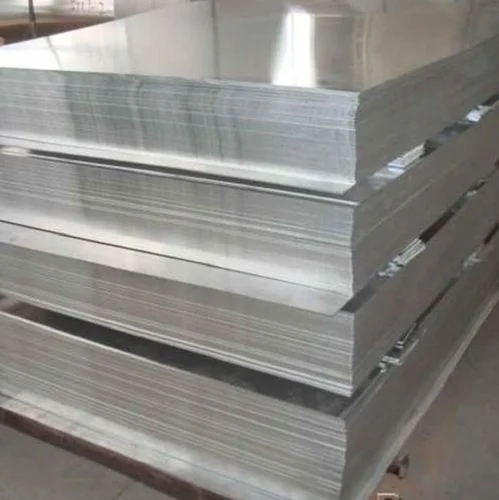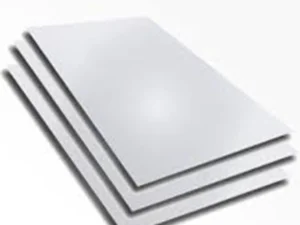Description
321 Stainless Steel Sheets: A Reliable Workhorse for High-Temperature Applications
321 stainless steel sheets are a popular choice for a wide range of applications, particularly those involving elevated temperatures. This austenitic chromium-nickel stainless steel is stabilized with titanium, offering superior resistance to intergranular corrosion compared to other common stainless steels. This article will delve into the properties, advantages, and typical uses of 321 stainless steel sheets.
Understanding 321 Stainless Steel Composition and Properties:
The key to 321 stainless steel’s performance lies in its chemical composition. The addition of titanium ties up carbon, preventing it from forming chromium carbides at the grain boundaries during welding or exposure to high temperatures. This mitigates the risk of intergranular corrosion (also known as weld decay), a common issue with unstabilized stainless steels like 304 at temperatures between 800°F (427°C) and 1650°F (899°C).
Here’s a typical composition breakdown:
- Chromium: 17-19% (Provides corrosion resistance)
- Nickel: 9-12% (Stabilizes the austenitic structure)
- Titanium: 5 x %C – 0.70% (Stabilizes carbon)
- Manganese: 2% max
- Silicon: 1% max
- Carbon: 0.08% max
- Phosphorus: 0.045% max
- Sulfur: 0.03% max
- Iron: Balance
Key Properties of 321 Stainless Steel Sheets:
- Excellent Weldability: 321 stainless steel exhibits excellent weldability using most standard welding techniques. Post-weld annealing is generally not required due to the titanium stabilization.
- High-Temperature Strength: Maintains good strength and resistance to oxidation at elevated temperatures.
- Superior Corrosion Resistance: Offers good corrosion resistance in a variety of environments, comparable to 304 stainless steel in most applications.
- Creep Resistance: Exhibits good creep resistance, making it suitable for applications involving sustained stress at high temperatures.
- Good Formability and Fabricability: Can be readily formed and fabricated using standard techniques.
Advantages of Using 321 Stainless Steel Sheets:
Compared to other stainless steel grades, 321 offers significant advantages in specific applications:
- Resistance to Sensitization: Prevents intergranular corrosion when exposed to temperatures within the sensitization range (800°F – 1650°F).
- Suitable for High-Temperature Use: Maintains its strength even under prolonged exposure to high temperatures, unlike unstabilized grades.
- Eliminates Need for Post-Weld Annealing: The titanium stabilization generally eliminates the need for post-weld annealing, saving time and cost.
- Versatile Application: Can be used in a wide range of industries and applications where high-temperature performance and corrosion resistance are crucial.
Typical Applications of 321 Stainless Steel Sheets:
The unique properties of 321 stainless steel make it an ideal material for various applications across diverse industries:
- Aerospace Industry: Used in exhaust systems, jet engine parts, and other high-temperature components.
- Chemical Processing: Employed in pressure vessels, heat exchangers, and piping systems.
- Power Generation: Used in boiler components, superheaters, and other critical parts.
- Oil and Gas Industry: Found in refinery equipment, pipelines, and offshore platforms.
- Automotive Industry: Used in exhaust manifolds and catalytic converters.
- Heat Exchangers: Effective material for building heat exchangers due to its high-temperature strength and corrosion resistance.
- Furnace Parts: Utilized for components exposed to high heat in industrial furnaces.
Considerations When Choosing 321 Stainless Steel Sheets:
While 321 stainless steel offers a robust solution for high-temperature applications, it’s essential to consider the following factors:
- Cost: 321 stainless steel is typically more expensive than unstabilized grades like 304.
- Lower Machinability: Contains titanium carbide inclusions that can negatively impact machinability compared to other stainless steels.
- Potential for Knife-Line Attack: In certain highly corrosive environments, 321 can be susceptible to “knife-line attack,” a localized corrosion phenomenon near the weld fusion line. In such cases, consider using a more highly alloyed stainless steel.
Conclusion:
321 stainless steel sheets are a reliable and versatile material for applications demanding high-temperature strength, corrosion resistance, and weldability. Its titanium stabilization effectively combats intergranular corrosion, making it a preferred choice for demanding environments. When selecting a material for your next project, carefully evaluate the operating conditions and weigh the advantages and considerations of 321 stainless steel to ensure optimal performance and longevity. Remember to consult with a materials expert to determine the most appropriate grade for your specific needs.











Reviews
There are no reviews yet.